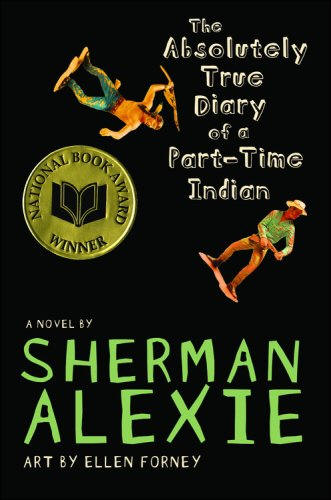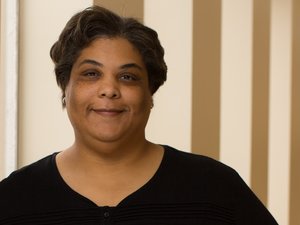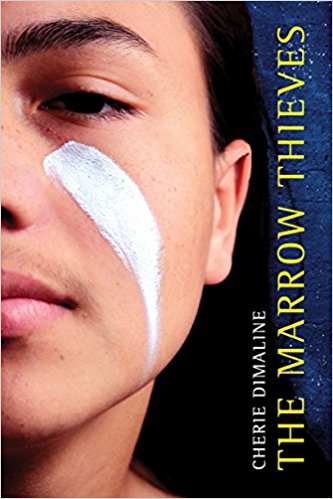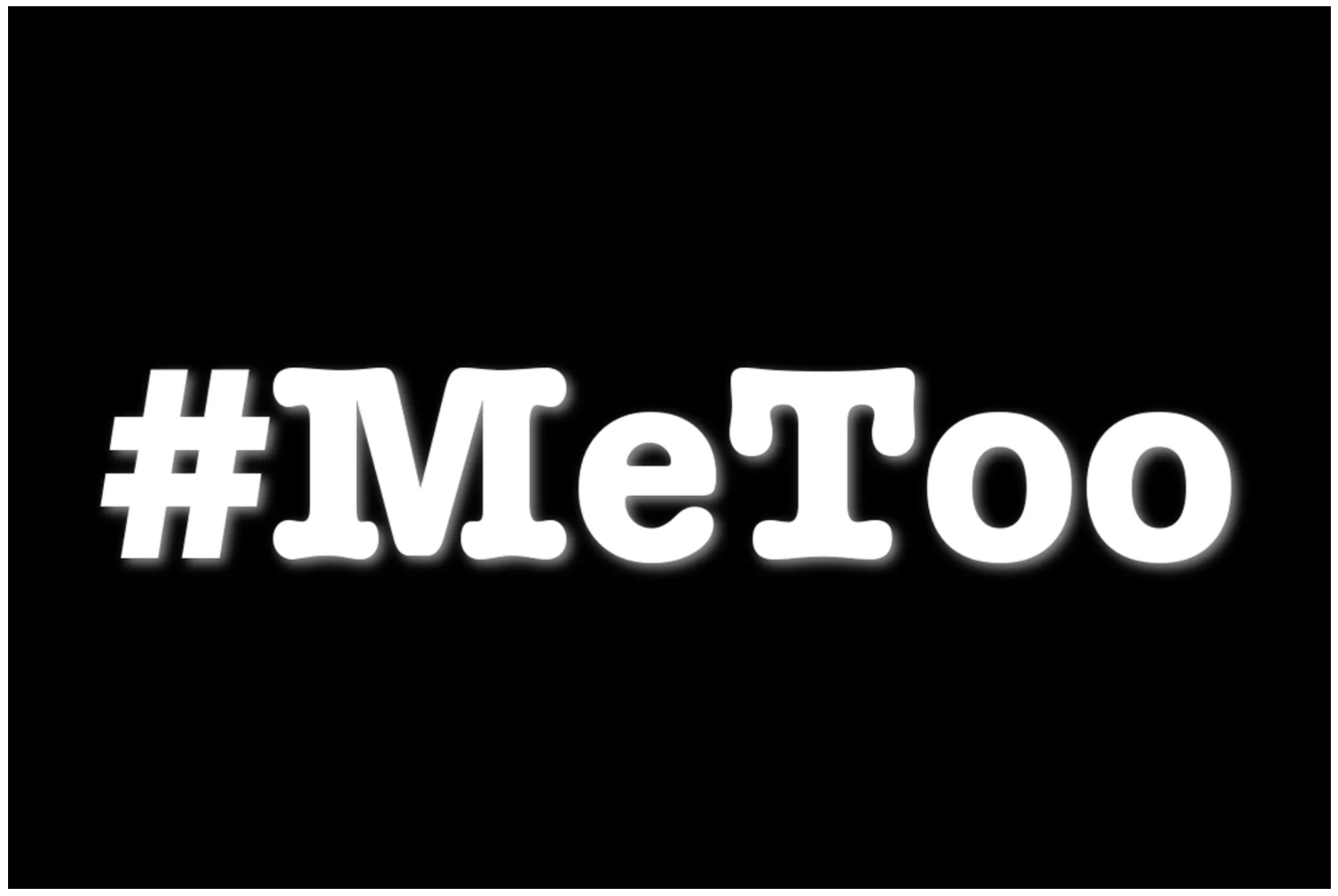 As many teachers do, I teach Sherman Alexie’s Absolutely True Diary of a Part-Time Indian. When confirmed reports of his sexual harassment and other abuses of power became public, I knew I had to talk to my class about it – I had already taught Absolutely True Diary in my on-line Multicultural Children’s Literature class earlier in the semester. Thinking that our conversation might be of use to others who are confronting this issue, I’m sharing my initial question, my response to their conversation (which highlights recurring themes), and a quotation from one of the students (shared with her permission). Because I have to prepare our on-line conversations several weeks in advance, this begins in early March but their responses were only due in late March – and my response followed.
As many teachers do, I teach Sherman Alexie’s Absolutely True Diary of a Part-Time Indian. When confirmed reports of his sexual harassment and other abuses of power became public, I knew I had to talk to my class about it – I had already taught Absolutely True Diary in my on-line Multicultural Children’s Literature class earlier in the semester. Thinking that our conversation might be of use to others who are confronting this issue, I’m sharing my initial question, my response to their conversation (which highlights recurring themes), and a quotation from one of the students (shared with her permission). Because I have to prepare our on-line conversations several weeks in advance, this begins in early March but their responses were only due in late March – and my response followed.
6 March 2018
Because I’m preparing these discussions about three weeks in advance, this will appear as “due” after March Break. And that is in fact when it is due. I don’t feel I can add anything further to our current week. But I also don’t feel that I can ignore this. So I am making this visible now (March 6th) even though you’re not obliged to discuss it until March 27th.
For the past month, those of us in the children’s literature / young adult literature community have known that Sherman Alexie is among those accused of sexual harassment. Last week (Feb. 28), Alexie issued a denial/apology. Yesterday (Mar. 5), three of his accusers went public.
This raises an important question for us – as students, future teachers (some of you), or current teachers (me and some of you). Should we continue to teach an author who has harmed others? And that is the question I am posing to you right now. Should work by Sherman Alexie be on future iterations of this syllabus? Or ought we instead replace him with, say, a work by another indigenous writer – perhaps Cherie Dimaline’s The Marrow Thieves –?
This is a hotly debated question, and – from our previous conversations – I know that you will express yourselves with care and consideration for divergent points of view. Those who argue for often note that those who create great works of art may not lead exemplary  lives; their own personal failings are irrelevant to the greatness of their art. And, certainly, as a colleague of mine observed via email, in our English classes we teach many writers who, in their private lives, were horrible human beings. Those who argue against might say that there is no legacy so important that we can look the other way. As Roxane Gay puts it, “I no longer struggle with artistic legacies. It is not difficult to dismiss the work of predators and angry men because agonizing over a predator’s legacy would mean there is some price I am willing to let victims pay for the sake of good art.” She suggests instead that we turn to artistic work created by those “capable of treating others with respect.” If these are two opposing poles of the debate, there are of course many positions between them. And there are other ways of exploring possible answers to this question.
lives; their own personal failings are irrelevant to the greatness of their art. And, certainly, as a colleague of mine observed via email, in our English classes we teach many writers who, in their private lives, were horrible human beings. Those who argue against might say that there is no legacy so important that we can look the other way. As Roxane Gay puts it, “I no longer struggle with artistic legacies. It is not difficult to dismiss the work of predators and angry men because agonizing over a predator’s legacy would mean there is some price I am willing to let victims pay for the sake of good art.” She suggests instead that we turn to artistic work created by those “capable of treating others with respect.” If these are two opposing poles of the debate, there are of course many positions between them. And there are other ways of exploring possible answers to this question.
As I say, it’s a difficult, messy question.
I have my own answer to it, which I will share after our conversation – and, indeed, which might be changed by our conversation.
Time passed – including March Break – and the students’ conversation unfolded on-line. It was the most contentious conversation we’ve had this semester, but – to their great credit – they remained civil even when they strongly disagreed. I then wrote my promised response, which I reproduce below.
30 March 2018
Hi, everyone. Sorry I’ve been a little quieter this week. Have been a bit under the weather. Indeed, your El Deafo discussion (two weeks from now) lacks my second planned video because my voice is still a bit wonky.
Anyway. To this discussion!
Thanks, as ever, for wrestling with a difficult and painful subject. You may be interested to know that – here on campus – we held a discussion on this subject before March Break. The English Department blog published a summary of that discussion on Tuesday of this week.
In your discussion, some liken the removal of a book from a course syllabus to censorship. I see the parallel being made, but – as the creator of many syllabi – I would argue that removing a book from a course syllabus is not the same as censorship. The book is not banned. It is still for sale, and still in the library. Also, since I regularly revise my syllabi, I am often taking books off and putting others on. I do this for many reasons, including the never-ending quest to improve the course, the need to stay current (new books keep getting published), and my own need to refresh the syllabus (if I teach the same works over and over, then I risk getting stale).
 Another theme I notice in your discussion is the idea that removing this book would consequently remove Native American literature from our Multicultural Children’s Lit syllabus. It wouldn’t. We could read Erika Wurth’s Crazy Horse’s Girlfriend, Cherie Dimaline’s The Marrow Thieves, Cynthia Leitich Smith’s Rain Is Not My Indian Name, or Louise Erdrich’s Birchbark House. Debbie Reese makes some Native YA Lit recommendations in this blog post. There are many Native children’s and YA books to choose from. Indeed, there should be more than one on this syllabus. There isn’t because the class strives to cover as wide a range of identities as it can, which (I realize) risks making this book the “single story” that Adichie warns against.
Another theme I notice in your discussion is the idea that removing this book would consequently remove Native American literature from our Multicultural Children’s Lit syllabus. It wouldn’t. We could read Erika Wurth’s Crazy Horse’s Girlfriend, Cherie Dimaline’s The Marrow Thieves, Cynthia Leitich Smith’s Rain Is Not My Indian Name, or Louise Erdrich’s Birchbark House. Debbie Reese makes some Native YA Lit recommendations in this blog post. There are many Native children’s and YA books to choose from. Indeed, there should be more than one on this syllabus. There isn’t because the class strives to cover as wide a range of identities as it can, which (I realize) risks making this book the “single story” that Adichie warns against.
I would, however, agree with those who note that (and I’m paraphrasing here) monstrous people have made great art, important art, influential art. Faulkner’s “go slow, now” approach to ending Jim Crow was immoral and unjust, but if I were teaching a class on twentieth-century American literature, I would assign Faulkner. If I were teaching a class on twentieth-century Native American Literature, I think I would also assign Alexie – bringing in the full context, the women who have spoken on the record, the women who have spoken off the record, those who defend Alexie and those who accuse him. We could have a more developed version of the conversation we’ve had here.
But I don’t teach a Native American Literature course. I teach a Multicultural Children’s Literature course and I teach a Young Adult Literature course. Alexie’s Absolutely True Diary has been on both of those syllabi. It will not be on either syllabus in the future. There are many reasons why, but here are four.
- William Faulkner is dead. Sherman Alexie is alive. If I assign Alexie’s books (and thus mandate that my students buy his books), I am continuing to pay his salary. I would rather pay the salary of a person who has managed to create good art without harming others. Since there are plenty of such people, I will be assigning Cherie Dimaline’s The Marrow Thieves next time.
- The books I assign in both classes go on to become books that future teachers assign: Secondary Education majors take Literature for Adolescents, and I know that this class has some Education majors in it, too. So, in assigning a book, I am in essence recommending that book for tomorrow’s teachers. I am making it part of the children’s literature / YA literature canon, enshrining it in the curricula of tomorrow.
- Sherman Alexie’s treatment of women is diametrically opposed to the goal of a class like Multicultural Children’s Literature. As I say in that opening video, the books we read are about increasing understanding, and respecting others. I cannot in good conscience promote the work of a man who does the opposite of what this class aspires to do.
- As his denial/apology indicates, Alexie does not understand why his behavior was wrong. If he understood, apologized, made efforts to make amends, well, there would at least be the possibility that I might assign him again in the future. But he doesn’t get it. He says “I genuinely apologize” but also “There are women telling the truth about my behavior and I have no recollection of verbally threatening anybody or their careers.” So, which behaviors are true, then? He says, “I have made poor decisions,” but declines to name what those decisions were, which makes it hard to believe that he is “working hard to become a healthier man who makes healthier decisions.” If he does not understand why his behavior was wrong, then he cannot learn from his past. You need to know why a mistake is a mistake in order to change.
Because, yes, as some of you have correctly noted, humans are flawed. We make mistakes. We have regrets. We do things we should not do. And we would be naïve to expect our artists, writers, actors, musicians, to be paragons of virtue. But, for me, a pattern of predatory behavior crosses a line.
Though my sense is that not all of you do, I believe the accusers. Why? Many reasons, the first of which (as I say) is that there is a pattern of behavior here. When there’s a pattern, we cannot say, “oh, it was just this one isolated incident.” Also, it’s really really hard to speak publicly about being sexually harassed or assaulted. Women who do get slut-shamed, called liars, blamed for seeking publicity, harassed further, and may face professional consequences. When a woman makes the decision to speak up, she is putting herself at risk. That’s why so many of those men named in the #MeToo movement have gone unnamed until now. Calling out the predatory behavior of powerful men (or women, but it’s usually men) is risky. It’s necessary to call them out, but it requires a level of bravery and emotional strength that not all people have – and nor should they be required to have. Surviving the traumas of harassment and assault takes a lot out of a person. (Big understatement.)

The emotions in this discussion have been more raw than they usually are – which is quite understandable, of course. I mention it here for several reasons, the first of which is that a couple of days have elapsed since the discussion and my response. I wish we could have had this conversation in person because then we could have addressed some of these questions in person. The asynchronous nature of this class means that we could not. But, since we could not, you should know that you all did far better than all of the on-line discussions I’ve seen on this subject. There have been much more contentious posts on recent School Library Journal articles, for example. This discussion never even approached that level of vitriol. Indeed, it was remarkably vitriol free.
That said, I recognize there may yet be some frayed nerves and lingering bad feelings. So. If anyone would like to talk with me about this, please let me know. I am willing to set up a Zoom chat for anyone who’d like it – or multiple Zoom chats. And, whether people seek those or not, I ask that you do your best to sustain the professionalism you’ve managed to sustain throughout the term. We do not have to agree with each other, but we do have to make an effort to understand and respect each other.
For the record, I respect the variety of opinions offered here. I’ve given you my response because I promised that I would. But, as I’ve said before, you do not need to agree with my assessment of a book or, in this case, whether to teach the work of a particular author.
For those who want to read more about this, Debbie Reese has a chronicle of the Alexie story as it unfolded (when you click on the link, scroll down).
Finally, if I may, I’d like to close with the wise words of your classmate Maria Vieyra, who (in this discussion) writes:
None of us are epitomes of perfect ethical behavior, morality, or wisdom, but I believe most of us can agree that there should be consequences for predatory sexual behavior because it does indeed hurt people. And monetary costs from boycotting a book are a small form of justice that we are all able to be a part of, and I do not think it is too heavy a price to pay for the sake of the victims and the future.
Well said.
To all of you: Thanks ever so much for taking the time to wrestle with this contentious and difficult issue. I hope that, though your own responses may differ, you all have arrived at a deeper understanding of what’s at stake in either retaining a book or removing it.
So… that was our class discussion. Also, I didn’t mention this in my response above, but most students thought I should continue to teach Alexie. Five students – all of them women – argued against teaching his work. (18 students participated in the discussion.)
I would not claim to have the “right” answer to the question of whether to teach Alexie. This is just my answer. I would say, though, that each syllabus is a political document that is built on moral choices. What we include on a syllabi and what we omit from that syllabi are deeply enmeshed in morality and in politics – which, of course, makes the creation of any syllabus fraught, complicated, and on some level unsatisfying. (Or, at least, that’s my experience: I am never 100% happy with any syllabus I’ve created.)
Art is always political. So is teaching. We cannot pretend otherwise.

Marah Gubar
Philip Nel
Marah Gubar
Debbie Reese
Philip Nel
Laura Jimenez
Philip Nel
Sarah H
Philip Nel
Debbie Reese
Philip Nel
Emily Schneider
Hope
Philip Nel